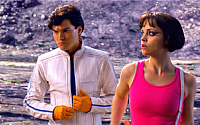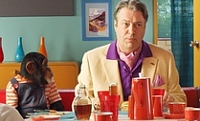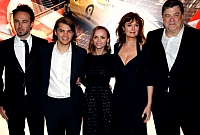Keeping up with Emile Hirsch, Susan Sarandon, Christina Ricci, John Goodman, Kick Gurry and Joel Silver • Page 2 of 2
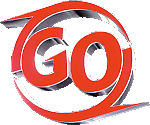
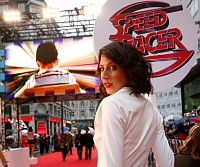

 For the most part, they agree that it wasn't too stressful shooting on a green screen. They just had to trust the directors.
For the most part, they agree that it wasn't too stressful shooting on a green screen. They just had to trust the directors."Although you were alone so much of the time," Susan says to Emile.
"Yeah, I spent 20 days along on the gimbal," he replies. "That wasn't much fun. They could shake and turn me in any direction. It was like being tortured. In solitary confinement."
"It made him a better man!" Susan adds. "In some ways the green screen is easier than making a normal movie. You can imagine what's there rather than what's not there. Like on a regular set where you're doing a love scene with a camera in your face."
But when working on a bare stage, how do you interpret stage directions?
"I never read directions in a script," Susan admits, in her trademark candid style, "and this script had pages of directions. But it was impossible to figure out what it was saying. You just have to surrender yourself to their imagination. And then you see it on the screen, finished, and it's like a drug trip."
Emile agrees that this kind of film requires a very different kind of preparation. "Normal training wouldn't apply," he says, "so I played lots of simulation videogames and then went to a motor speedway with NASCAR driver Jimmy Johnson for a bunch of races. That was really wild. And we also did a bit of go-carting."
Normal training wouldn’t apply, so I played lots of simulation videogames.
Susan confesses an affinity to all of this vroom-vroom action: "After Thelma and Louise, I started driving fast and never slowed down." She also acknowledges the sheer scale of this film in a remarkably serious and detailed analysis of the differences between this and her first movie, The Rocky Horror Picture Show, filmed on partial sets outside London in the early 1970s. Her comparison of the artistry of the two films gets increasingly dry and hilarious, until she concludes: "Well, you could take your kids to this one."From here the conversation picks up the British theme, as they discuss why a British actor was hired to play the film's villain. "We're still frightened of you," John deadpans to the assembled British press.
"Actually, there aren't many American movie stars who can say that many words so quickly," Susan adds," and nail it every time. We're verbally challenged, but Roger was amazing. There was that time during one of his big speeches when the chimp climbed on his lap and jumped up and down, and he never missed a beat. He got all the way to the end of the speech."
"Me don't know," John grunts.
"Basically, the film industry isn't very brave," Susan continues. "It's not just about women, there aren't many great roles for anyone. The studios just want to make the same thing over and over, and not think outside the box. But I'm happy to work even in a supporting role if it's something interesting or fun." And working for Andy and Larry Wachowski was clearly a draw for everyone.
Although the brothers were in London for the premiere, their contract stipulates that they don't have to appear at press conferences, preferring instead to let their films talk for themselves. "Being directed by them," says John, "is like being polygamous. You get yelled at from both sides! But they're brilliant, and they have one mind."
You always want to create a franchise if you can; this would be great as a franchise.
"It was very important for both of them to protect the humanity of the piece," says Susan. "The family issues are very important to them -- the David taking on the Goliath. They were concerned to keep that intact within this big blockbuster movie."Which raises the fact that the film is about a small guy taking on a big corporation, even as the film itself has been made and is being marketed by one of the biggest media conglomerates on earth. "The irony was not lost on me," says Emile. "But I was happy to work with Warner Bros and play a character who doesn't sell out. It's also true that doing things like this gives you the ability to do the other, smaller things."
Kick, whose experience has been in independent films in his home country Australia as well as things like David Mamet's Spartan, says, "Making this movie actually felt we were like making an independent film. The Wachowski brothers were there with a clear vision, and Joel was there protecting them from the studio."
"It's a whole new world out there," Joel says. "Games and films are blending together, and kids can accept this kind of heightened realism, here or in something like 300 or The Matrix, on several formats. New movies inspire games, and new games inspire movies. We've come a long way from Pong! And you always want to create a franchise if you can; this would be great as a franchise! It just depends on the audience -- if they come, and if they like it."
Whether or not there's a sequel, Emile knows the film will change his life more than anything else he's done. "Maybe I should get my car's windows tinted. It's a little embarrassing when I'm sitting there in my Toyota Prius and people pull up beside me and scream, 'Ooh, it's Speed Racer!'"
DORCHESTER, LONDON, 29.APR.08
HOME | REVIEWS | AWARDS | NEWS | FESTIVAL | Q&A | ABOUT | TALKBACK
